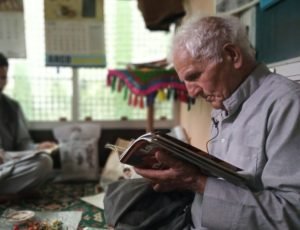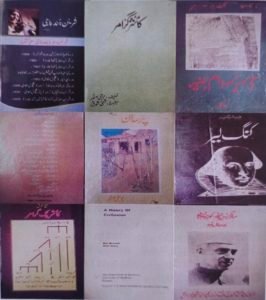
Najhi Munawar sat on his veranda sorting out different types of seeds and handing the ones needed to his granddaughter, and keeping the rest on his right side, neatly folding them up in paper and then wrapping them up in polythene. That is how we met the octogenarian scholar of Koshur.
Munawar welcomed us with fresh cherries handpicked by his grandson who was working with his mother in their kitchen garden. As we showed him our work, Munawar’s expressions changed constantly. “Your work is very impressive and appreciable. However, there is a basic flaw in it which is of language. The language, instead of English, should have been Kashmiri,” Munawar said.
He said that modern children do not know what paddy is called in Koshur but they do know what it is called in English. “You are introducing to him kanger, yechh, tasrupdar etc. But that is not enough. I know it is not easy to run an educational magazine in Kashmir. But you are on the ground; you know better why you picked English as a medium to teach children about their own mother tongue,” Munawar added while flipping through the pages of one of the issues of our magazine.
Munawar was equally critical about the reading culture of Kashmiri children and teenagers. “Before teaching children what to read, I think parents should teach them to read first. The rat race to score in exams can get you a job but it can’t build your personality. For that, magazines like these should be read. I had a passion for reading since I began to be conscious of the world around me and after my matriculation I read Pandit Nehru’s book, Letters from a Father to his Daughter. Nehru tells his daughter how a pebble can teach many things to a child if only she thinks a bit harder. That was also my first translation. Imagine a 16 year old kid getting recognized by the prime minister of India for his translation of the prime minister’s book. That is how I got into children’s literature.”
After that, Munawar began compiling folk songs and folk tales. Ibtida is the word he used for beginning. Among the folk songs, ladisha and bisht bisht braryo were the first to be compiled by him. After praising the beauty of Koshur, Munawar added, “I don’t think you will find a match for such a folk song as bisht bisht braryo khotkho wan in any other language.”
There is a three language system operating in our education system: the indigenous language, Hindi or Urdu and English. Munawar believes that no matter how many languages a child is taught in a school, the medium of instruction should be the mother tongue. “Earlier there was a perspective that if there are job opportunities in an indigenous language, that particular language is more likely to flourish. But the corruption has changed everything. Today’s PhD holder in an indigenous language isn’t so articulate that he can explain his ideas to another PhD holder in the same language. Moreover, schools sell the ‘English medium’ tag as part of their product. They do not have any understanding of what a language actually is,” explains Munawar.
Children’s literature isn’t the only thing Munawar has worked on. He is more involved in research and translation. “But I set the foundation of children’s literature in Koshur. At first, I only compiled whatever was already there in oral tradition and later on I wrote my own poems, nazms, riddles, etc.” His first book on children’s literature was published in 1959 when almost no one had an idea about what it was all about. He showed ZL team his books. Here are the photographs of some:

Munawar is of the opinion that one doesn’t need to have a degree in Koshur to start contributing to it. “I have a younger brother, Mohd Shafi Shouk. He has headed the Kashmiri Department in Kashmir University. But he has a PhD degree in English literature. That isn’t corruption, but talent hunt. He graduated while he was in jail. That is the beauty of an indigenous language. You know everything. All you need to do is to observe things in depth.”
Munawar’s message to the youth is: “Khidmat of Kasheer would be to contribute something to Koshur culture which includes Koshur literature.”

